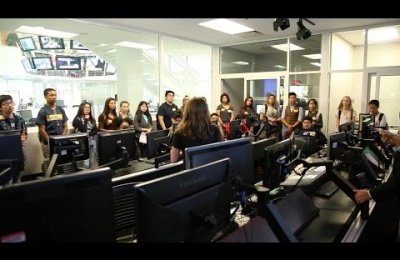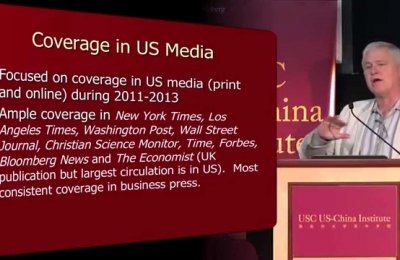Five students in the Master's Program in Public Diplomacy returned to USC Annenberg recently from a two-week trip to Ho Chi Minh City, Vietnam and other Southeast Asian cities. While abroad, the students conducted research in their respective areas of interest.
The trip was conceived and organized by second-year MPD candidate Candace Burnham, who spent last summer in Ho Chi Minh City at the U.S. Consulate General as a State Department public affairs intern. "I thought, ‘How can I share this with everybody?’" Burnham said.
The previous year, Burnham was part of an MPD student delegation that visited Dubai; this year, Burnham proposed and had accepted a trip to the Vietnamese capital under the umbrella theme of "comparative public diplomacy."
"How do different organizations," Burnham wondered, "do public diplomacy in a controlled or constricted environment like Ho Chi Minh City?"
A group of fellow MPD students including second-year student Mark Preston and first-years Jerry Edling, Zhaleh Boyd and Emina Vukic joined Burnham to find out.
Sitting recently in the USC Annenberg west lobby, Preston, Edling and Burnham thanked and praised school administrators such as Abby Kaun, associate dean of Academic Programs and Student Affairs, and professor Nicholas J. Cull, director of the Master's Program in Public Diplomacy, for creating an environment where such direct, diverse and substantial international inquiries are not only possible, but partially funded.
"This is exactly the kind of thing that makes our program unique," Preston said. "It's these entrepreneurial experiences, ventures and pursuits that are so generously supported by Nick Cull. He actively encourages each of us to go out and do these things, not only as a learning experience but as something useful that will enhance our career."
The trip, which was timed to overlap with USC's Spring Break, began with Burnham arranging the core of the Ho Chi Minh City itinerary. The Trojan quintet met with officials from the U.S. Consulate General, U.S. Commercial Service, Habitat for Humanity, Loyola University Chicago, East Meets West and the Consulate General of Canada.
During the trip's second week, the MPD crew headed off in different directions, before most of them reunited in Hong Kong in advance of the fifteen-hour flight to Los Angeles. Preston, who, for example, is interested in aviation biofuels, went to Malaysia and inspected rubber trees and ginger plants and met with officials from the Forest Institute of Malaysia.
Edling, who was of draft age but wasn't conscripted during the Vietnam War and is transitioning from a media to a public diplomacy career, headed to Cambodia and Thailand. In the former, he discussed deforestation issues with a ranking forestry ministry official.
Boyd, a first-year MPD student who blogged here about investigating "the role of communications in both perpetuating and combating human trafficking in Vietnam" – was heading north from Ho Chi Minh City to Hanoi to meet with groups such as the International Organization on Migration and the UN Inter-agency Project on Human Trafficking.
"Human trafficking in Vietnam registers many of the usual suspects found worldwide," Boyd blogged. "Multi-tiered crimes, cross-border ramifications, lack of empirical data, several precedents but few norms, corruption within anti-trafficking initiatives, victims too terrified to testify, and lack of cohesion among concerned parties."
While the trip went off smoothly, there were at least some pre-departure anxieties. Three weeks prior to the trip, Burnham had booked only one Ho Chi Minh City appointment. The dearth of early bookings, later rectified, wasn't due to a lack of connections, effort or resourcefulness.
Instead, it was a first-hand lesson about the challenges of practicing public diplomacy in a developing nation where the civil society sector isn't quite as bustling as the hard-to-cross, motorcycle-and-scooter-jammed roads.
"Even some of the NGOs were afraid of how it would look if they met with us," Burnham said. "If the Vietnamese government found out they were meeting with us, what would they think?"
What could be so intimidating about five students? "There's no academic freedom in Vietnam," Burnham said. "And a lot of the areas that these NGOs work in are areas that the government does not want public, like human trafficking, minority or religious issues."
Edling, the incoming editor of the school's Public Diplomacy Magazine, picked up on Burnham's observation. "Public diplomacy [in Vietnam] is very indirect and kind of oblique," Edling said. "They'll set things up on a very innocuous subject area, but then the hope is that in the course of the discussions during the meeting they can get other points across."
The students say that's in part a lingering legacy of the Vietnam War. "Bilateral relations were reestablished in 1995," first year MPD student Vukic wrote in one of her two blog posts about the trip, "but any public affairs activities and diplomatic efforts can easily be misinterpreted as a threat for the communist regime."
Keeping all this in mind, the MPD contingent didn't engage in formal discussions about topics such as human rights or freedom of the press. But issues such as tourism and the environment proved to be accessible points of entry. Preston, Public Diplomacy's outgoing editor, for instance, met in Ho Chi Minh City with a ceramics factory owner who has instituted improved ecological standards and accountability.
Preston signed up for the trip abroad to research whether corporate social responsibility practices are deemed important in the city he calls the "New York of Vietnam." "The answer appears to be yes," Preston blogged, "but with many shades of gray."






![[web series] Campaign Junkie](https://annenberg.usc.edu/sites/default/files/styles/news_index_featured_small/public/media-youtube/d5gbSRAjFwQ.jpg?itok=YP9_X3fc)

